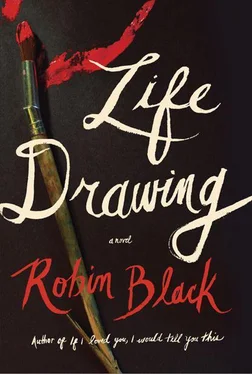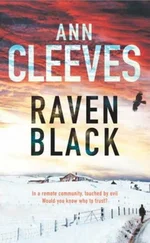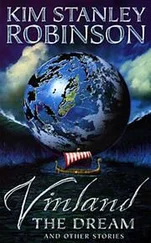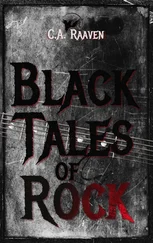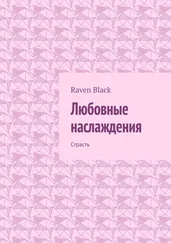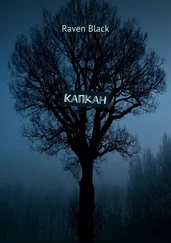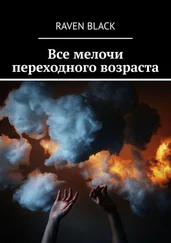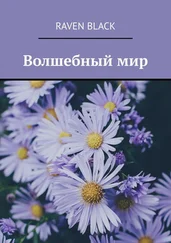Over those same days, I continued to push myself to understand what I wanted from the newspaper soldiers — or what I wanted to give to them. It didn’t matter how inherently interesting they were, or how their entombment in my walls resonated with my own obsessions; if I couldn’t find my way into the project, it was about nothing more than a curiosity found during a bathroom renovation.
But then, one morning I woke up with an idea. Like spontaneous generation, this sudden certainty about what to do.
The first canvas I envisioned was of two soldiers, WWI soldiers, in my living room, on my furniture, playing chess. The pale brocade couch, the old orange armchair, all of it ours. The trees through the window, our trees. Our house. And them. These too-long-dead boys released from my walls, set back into motion. I imagined one leaning forward, intent on his next move. Jackie Mayhew, learning how to play chess. The other boy grinning from ear to ear.
I rose and went downstairs, leaving Owen still asleep. As the coffee brewed I grabbed a sketchbook, a few pieces of charcoal from my studio. By the time Owen shambled down, an hour or so later, I was lost, a half-empty, cold cup of coffee by my side. He didn’t say anything to me and I didn’t expect him to. I was working. Somewhere in my consciousness it registered that he went back upstairs; and then that he came back down. I may have smelled hints of his shower, soap, shampoo. I heard the kitchen screen door, the wooden clatter as it closed. I knew without knowing that he had gone to the barn.
Iwandered the house like a restless ghost myself that first day — a ghost with a sketchpad and charcoal. In each room I let myself imagine what these boys, these young men, might be doing. I didn’t have a particular idea in mind, not any one kind of activity. I didn’t think: It needs to be ordinary . Or: It needs to be childlike . In the guest bedroom, I sketched a boy opening the window. Just a very rough sketch. In the kitchen, I put one at the refrigerator, one at the stove, frying eggs. Another, sitting, his boot-heavy feet up on the table. I didn’t begin to think then about the level of logic involved in these works. Was I trying to depict an actual household? A strange barracks of a kind? Were these things all going on at once? At the same time of day? Would a single face appear in more than one room? Those were all questions I would ask in the weeks that followed, but then I just drifted from one space to the next.
I pushed aside another question too: how I was going to do paintings in which human figures played so prominent a role? I never had. But I would manage somehow, I told myself. My instincts couldn’t be this strong and also be wrong, I told myself — as if I had never made a passionate mistake in my life.
By dinner, I was bursting, but the sight of Owen’s somehow sunken face silenced the excitement I wanted to share. I have always been an artist who talks through her projects. I like having conversations with people about what I’m doing. It helps me think. But with Owen in the state he was in, I knew it was wrong to crow about my breakthrough and my sudden conviction — necessary at the start of every project — that I was about to do the best work of my life. When he finally got around to asking me how my day had gone, I just said, “I think it’s moving forward.” And when he let the subject go at that, I tried hard not to resent his failure to detect the insincerity underlying my casual tone. A rich man has no business expecting a starving man to ask him how his four-star dinner was that night.
“I think I’ll do some shopping tomorrow,” he said, as we ate. “We’re out of stuff and I could use a change of scene.”
I heard the invitation, but giving up the next day’s work was unthinkable. I said nothing and after a bit he said, “So make me a list if there’s anything you want.”
“I will,” I said. “Thanks.” And then, “Shampoo, I think. And toilet paper too. Definitely toilet paper.”
“Just make a list,” he said.
Idon’t know at what precise moment it occurred to me that maybe I could talk to Alison about work — mine and hers — but the next day, while Owen was on his shopping trip, I walked over the hill and knocked on her door with that in mind.
“Hold on …,” I heard.
“It’s Gus,” I called through the glass panes, watching her emerge from the kitchen, a dishtowel in her hand. She wore a dress, as she always seemed to do, this one pale blue, and glasses, great round ones with black rims. They were large enough that they might have looked ridiculous, but instead, by contrast they made the delicacy of her features even finer. She had lipstick on, a bright coral, something I found vaguely disconcerting since she had been alone.
Once I knew she’d seen that it was me, I tried to open the door, but it was locked.
“Hang on,” she said, turning one knob and then another. “How nice of you to come by.” To my surprise, she leaned to kiss my cheek. I wondered if any of the coral had stayed on me.
“It’s been three days since I did any dishes.” She folded the towel. “It’s tricky living by oneself, isn’t it? You think there’s nothing to clean, no one to do it for, and the next thing you know, there are fruit flies everywhere.”
“Oddly enough, I’ve never lived alone.” I was wondering whether I too would keep my doors locked in broad daylight, if I did.
“Well, I never had either, until I left Paul, but now I do, blissfully so, except for missing Nora. And the odd touch of loneliness, now and then. Which will get some relief when she visits.” She smiled, delight at the thought immediately evident. “Are you here for a reason? Have I been too loud?” she joked.
“Yes, that’s it,” I said, looking around. “Too many wild parties.” In the time since our dinner there, she had made the house seem much more like a home. There were books in the bookshelves, throw rugs on the floor. “No, I just came by to say hello, to see how you’re settling in.”
“Shall we sit out back?” She shook out, then refolded the towel as she spoke. “A bit early for drinks, but I could brew some coffee …”
I noticed a narrow streak of paint, yellow paint, on her arm.
“Actually,” I said, “I would love … if you feel comfortable … I would love to see your paintings.”
“Ah.” Her sudden nervousness was visible, as was her quick resolve. “Well, in that case, why don’t we head upstairs?”
The work reminded me of Beatrix Potter right away. Not Potter’s bunnies and mice, but her botanicals. They were watercolors, gouaches, and some ink drawings, works only a scientist could do. Or anyway, the mind that could paint plants and minuscule parts of plants at this level of scrutiny and detail was a mind that would also be drawn to scientific studies. Though Alison was no miniaturist. That was inherent in the impact the paintings had. They were enormous, the petal of a flower spanning two feet. Nature writ large. But they weren’t wholly clinical. There was something oddly affectionate to them, which was perhaps what brought Potter to mind. The focus loving rather than cold, despite the obvious scientific bent. The mood warm, rather than grand.
“They’re wonderful,” I said, meaning it — and relieved. “And to think that you called my work precise!”
“Well, I make tiny things huge. You paint such tiny details. Different kinds of precision, I suppose.” She walked around the room, touching the canvases. Still nervous. On a long, narrow table half a dozen microscopes sat, lined up beside another row, jars with flowers and leaves in every one. “I’m just an amateur, I know. But I do so love doing it.”
Читать дальше
